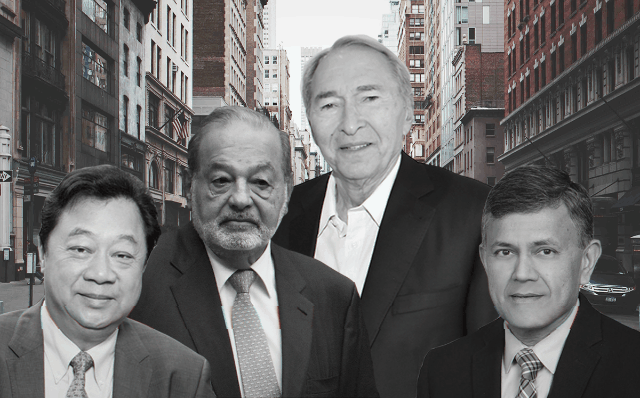Despite warnings of doom, city property tax revenue is up — but collection this year has been messy, an analysis by The Real Deal found.
From the tax bills issued in June, some $8.61 billion poured in through July 25, up 5.3 percent from the same period a year ago, thanks to higher assessments and new construction coming on line.
Payments increased in every borough, although delinquency grew in Manhattan, to 5.7 percent from 5.5 percent, and Staten Island, to 10.6 percent from 10 percent.
However, the city’s property-tax picture is far from rosy. Empty hotels have been unable to pay and the Department of Finance is struggling to credit payments promptly and accurately.
Read more



Manhattan’s delinquency stemmed in part from shuttered hotels, many of which have skipped payments, paid late or are just now entering into payment agreements. These included major hotels including the city’s largest, the shuttered New York Hilton Midtown, which in mid-August was the city’s top delinquent, owing $11.9 million that was due July 1.
Most hotel owners had hoped the government would freeze property taxes or slash their assessments. The latter was stymied by strict case law putting the taxable status date at Jan. 5 — well before the pandemic.
Vijay Dandapani, president of the Hotel Association of New York City, is angry the city is still charging hotels 18 percent interest on overdue taxes. “No one [else] charges that,” he said. “It would be no skin off their nose to lower the rate. We have been telling the mayor and the City Council this for months.”
Hotels’ property taxes are based on previous years’ income, which Dandapani called “a fiction at this point,” noting overall hotel revenue dropped 85 percent and occupancy plunged to 14 percent when Covid struck in late March. Normally hotels pay $1 billion in property taxes and $3 billion in overall city taxes. Dandapani predicted they won’t recover until 2025.
Pointing to hotels and tourism being “obliterated” and building owners struggling to collect rent while still having to make mortgage and tax payments, Staten Island Assemblywoman Nicole Malliotakis asked the city to freeze property tax collection or to reassess properties, to no avail.
“I wrote to the Department of Finance and they told me we are not allowed to do that and need legislation from Albany to do it,” she recalled. “So we passed legislation in Albany to allow them to do it. And they never did it. And they are full of it.”
Absent a huge federal bailout, the cash-strapped city is in no position to give up revenue. But it is also having a problem keeping track of it.
After changing vendors and computer systems, the Finance Department appears to be struggling with applying payments and credits, leaving owners with interest penalties that might accumulate unnoticed for months. The agency did not return numerous messages requesting comment on the newly uncovered issues with payments.
Its main computer interface — Property Tax System, or PTS — created chaos as soon as it went live in February 2019. In one example, thousands of residents and owners, including actor Bruce Willis, were issued inflated bills as all abatements were omitted.
This system was created by Tyler Technologies of Plano, Texas, under a 2013 contract worth $18.4 million. When it debuted, a Finance spokeswoman told the New York Post, “There are no systemic issues with the system. It’s a grand success. This is a big, big, big success.”
Finance contracts with several different vendors to process checks, electronic payments, refunds and the like, so pinpointing blame for mistakes is tricky, but finding them is not.
In June TRD flagged a 41 percent increase in the city’s square footage in Class 4, a designation for commercial properties. A source identified the cause as two vacant Queens parcels that added 529 million square feet. The parcels belonged to the Port Authority and were actually 377,320 square feet — and were tax-exempt. The report was quietly changed.
Department of Finance staff generated a list for The Real Deal of the top 25 delinquent properties as of Aug. 1, which owed $65 million due July 1. But less than half that amount remains unpaid. Indeed, many owners paid on time but were not credited or were credited late and now wrongly owe interest, or are waiting for abatements or other arrangements to kick in.
“Our audits have repeatedly shined a light on DOF’s mismanagement of tax collections, and New Yorkers, especially our most vulnerable who rely on well-funded city services, deserve better,” said City Comptroller Scott Stringer. “We’re in the midst of an unprecedented economic crisis and every penny counts.”
Noting that the “economic difficulties of commercial property owners are likely to continue for some time,” Paimaan Lodhi, senior vice president of the Real Estate Board of New York, added, “The city has yet to provide a transparent view of the number of owners who were unable to pay.”
Glitches galore
The crediting issues appear to be of pandemic proportions with mistakes going both ways. Of 30 properties examined by TRD, about a third had city crediting issues.
Take Tiffany & Co., which owns and is fully renovating its landmarked building on the southwest corner of Fifth Avenue and East 57th Street. The jeweler paid its full-year, $6.1 million tab at the end of June, but the transaction was recorded twice, giving Tiffany a $6.1 million credit. When TRD flagged the error, it was reversed.
During its renovation, Tiffany is subleasing in an adjacent East 57th Street building which previously housed Nike and is owned by the Trump Organization. Finance records show taxes have not been paid since January. But the landlord, Nike and the jeweler say all the taxes were paid.
Two retail buildings occupied by Ralph Lauren — the Rhinelander Mansion at 867 Madison Avenue and another at 888 Madison built in the same style for the retailer — were the only store properties on the most-delinquent list, purportedly owing $3.3 million. But the taxes were paid on time, said a source who has seen a copy of one of the checks. Another source added, “It appears to be an administrative error on the part of the taxing authorities.” One property has since been credited.
For most of July, it appeared that the office building owned by Sheldon Solow at 9 West 57th Street and another owned by the Chinese conglomerate HNA at 245 Park Avenue had failed to pay approximately $25 million due July 1. The payments were finally credited July 28. Both are serviced by Wells Fargo, which insisted the bills were paid on time. Meanwhile, each property had accumulated over $330,000 in interest by the time it was rolled back Aug. 7, records show.
The office building at 43 East 53rd Street that looms over the Lever Building and is notable for its giant O-shaped top window was developed and is occupied by Santander Bank. It was sold to and leased back from a Florida company that appears to still owe the city $1.5 million. The companies did not return requests for comment.
Carlos Slim Helú, once the world’s richest man, appears to owe $2.78 million in property taxes on his office building at 417 Fifth Avenue. When told of a missed payment from July and rising interest from a January payment that was not credited until February, property manager Roxana Girand of Sebastian Capital exclaimed, “That’s crazy. We always pay when it’s due.”
At least the billionaire was credited for the $133,000 half-year payment on the Duke Semans mansion, his 20,000-square-foot home at 1009 Fifth Avenue.
Despite paying on time for 123 William Street, New York City REIT still owed $2.4 million as of Aug. 11, city records show. Michael Anderson, the REIT’s counsel, said the city was paid on time by check. The firm is attempting to straighten things out.
Abatement problems
On the residential side, a large rental building at 555 West 42nd Street in Manhattan is on the list owing $3.1 million. A representative of the owner, Barings, a global investment management firm, said payment was made on time by electronic transfer and was still not credited as of Aug. 17.
An affordable housing project at 1309 Fifth Avenue has had a full exemption from property taxes since its owner closed on the property last fall. Yet Department of Finance records show $2.68 million was due in January and $2.9 million July 1.
Brooklyn’s only property on the top 25 delinquency list, the luxurious oceanfront rental building at One Ocean Drive, suffered that fate because its 421a tax abatement has not kicked in. “We paid everything that’s due,” insisted developer John Catsimatidis, the supermarket magnate and mayoral hopeful. The company was advised by counsel to wait for the abatements to be applied, two other executives said on condition of not being identified.
An abatement may also be the issue for the proposed twin-towered rental building at 34-46 Vernon Boulevard in Astoria. Still under development by Alma Realty, it was the only Queens property among the purported top 25 delinquents at $1.6 million owed. An individual who answered the phone said, “Lawyers are taking care of this,” before hanging up.
Waiting for an expected abatement is not always possible.
“Many lenders will not allow the borrower to let the taxes go into arrears even if most of it will be exempted retroactively upon approval of the 421a application,” explained YuhTyng Patka, a partner with Duval & Stachenfeld who does not represent either property. “So I always advise my clients to expect to pay the first year’s taxes upon completion unless otherwise negotiated with their lender.”
A Department of Finance spokeswoman said, “Exemptions cannot be applied until all approvals are received.”
The beleaguered 125 Greenwich Street ultra-luxe condominium project that’s still under construction already owed the city $4.1 million before missing its July bill for $1.9 million, putting the total above $6.1 million. The supertall-to-be also owes interest of $430,300 and counting.
Meanwhile, Fortress Investment Group, which bought the debt, and developers including Bizzi & Co. are fighting over the scraps. Neither answered requests for comment. The city’s tax bills are still being routed to one of the original developers, Michael Shvo, who was bumped from the job after his art tax woes came to light. He did not return a call.
In a tax servicer mistake, the large rental at 200 East 82nd Street, owned by Rockpoint Group, had its $2.2 million bill paid late. The payment was credited Aug. 4 and interest was adjusted six days later. But interest isn’t always properly credited and in this case, $20 in interest is still mounting on small past charges, some of which were belatedly credited.
An 833-unit cooperative on the Lower East Side at 453 FDR Drive, where apartments sell for $900,000, owes $1.5 million for July 1, $426,305 for April and a sidewalk repair charge of $182,140 from July 2019. A call to the manager was not returned by press time.
More hurting hotels
Of the 25 top delinquent properties on the city’s list, 10 are Manhattan hotels, including at least two still under construction: the Virgin Hotel, which owed $2 million, and the Marriott at 140 W. 28th Street, which owed $1.4 million. Both bills were paid in August.
The Virgin’s developer, John Lam of the Lam Group, the city’s largest hotel owner, reconstituted the Virgin’s investment group in July and is on track to complete the hotel next year, sources said. He also owed $1.4 million in taxes for his hotel on Pearl Street and paid that bill in mid-August. Payments for all his hotels come to some $30 million per year, a source said.
Like most of the other building owners on the delinquent list, Lam is challenging the assessed value. No reduction was applied for this tax year as the offers were “too low,” sources explained. Lam, the president of the America China Hotel Association, did not return requests for comment.
A delinquent standout is the New York Hilton Midtown on Sixth Ave. which at $11.76 million owed — over $12 million with interest and past due Fire Dept. inspection fees — is the top non-payer in the city. It is owned by a Tysons, VA-based real estate investment trust, Park Hotels & Resorts. Its new financial report states, “As New York continues to have ongoing restrictions on large gatherings and on certain out-of-state travelers, the Hilton New York’s operations remain suspended.” The company did not return calls and emails for comment over several weeks.
McSam’s DoubleTree Times Square West owes $2.57 million and is pursuing a payment plan, a spokeswoman said. Owners of the Dream Downtown are also seeking a payment plan for its $1.15 million bill while the hotel is temporarily closed, a spokesperson said.
The Gramercy Hotel owes $1.9 million and the Standard High Line in the Meatpacking District $3.9 million. Neither returned requests for comment.
The Doubletree at 8 Stone Street was credited on Aug. 7 for paying $1.7 million along with interest of $31,000.
The Surrey, the subject of a court battle, saw its payment of $1.87 million processed on Aug. 14. It included $41,000 in interest.
The Hotel Association’s Dandapani pointed out that most lender financial agreements preclude hotels from borrowing more money to pay property taxes. But with income way down, they are in line for assessment reductions in 2021.
“Next year everyone will go to the Tax Commission,” he predicted, “and everyone will get a cut.”
